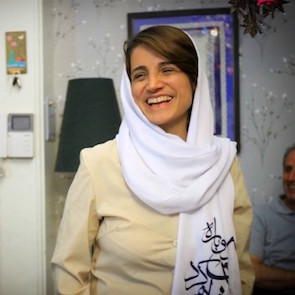
Nasrin Sotoudeh
''Two Iranian activists, lawyer Nasrin Sotoudeh and film director Jafar Panahi, are this year's joint winners of the European Parliament Sakharov Prize for Freedom of Thought. They were chosen by President Schulz and political group leaders on Friday morning.''
However, just as much, you need freedom, social security, the rule of law, and justice.
Prominent human rights lawyer Nasrin Sotoudeh has dedicated her legal career to representing opposition activists, women’s rights activists and young prisoners who were sentenced to death for crimes committed when they were minors. Her clients have included Nobel Peace Prize laureate Shirin Ebadi and pro-democracy activist Heshmat Tabarzadi, and she has also represented women who protested against the compulsory veiling in Iran and were subsequently prosecuted.
As a direct result of her human rights work defending protesters who had been arrested during the 2009 demonstrations against the contested re-election of ex-president Mahmoud Ahmadinejad, Nasrin Sotoudeh was previously imprisoned in Iran from 2010 until 2013. At this time she was charged with “acting against national security” and “propaganda against the regime” and sentenced to 11 years in prison and an additional bar on her practising law and leaving the country for 20 years. This sentence was later reduced to six years in prison and a 10-year bar on her practising law. During this time she was regularly held in solitary confinement in Evin Prison, her family visits and phone calls were restricted and denied and her family and friends were repeatedly harassed, including her daughter being placed under a travel ban. Following extensive international condemnation of the case and just days before an address by then Iranian President Hassan Rouhani to the United Nations, the woman human rights defender was released on 18 September 2013, after serving 3 years of her sentence.
Between 2013 and 2018, Nasrin Sotoudeh continued her work as a human rights defender. On 13 June 2018 she was arrested and charged with eight offences, including "propaganda against the state", "assembly and collusion" and “espionage”. These charges were based on her legal representation of opposition activists, young prisoners who were sentenced to death for crimes committed when they were minors and women’s rights activists, including women prosecuted for removing their mandatory headscarf.
She was sentenced in two different trials to 38 years and 6 months in prison and 148 lashes. One of the charges against her was “membership in an illegal group”, referring to her membership of Legam, a campaign to abolish the death penalty in Iran. According to Article 134 of the Islamic Penal Code, only the most severe punishment should be enforced. However, given the high number of charges against her, it is unclear how much of the sentence she will be expected to serve.
Since her arrest, Nasrin Sotoudeh, her family and friends have come under increasing pressure from the Iranian authorities.
In July 2020, the human rights defender’s husband, Reza Khandan, reported that his wife's bank accounts had been blocked by the Tehran Prosecutor's Office, despite none of the allegations against the woman human rights defender being finance related, and in August 2020 the human rights defender’s daughter was arrested and taken for interrogation. Later that month Nasrin Sotoudeh began a hunger strike in protest against the continued imprisonment of human rights defenders and prisoners of conscience in Iran despite the global Covid-19 pandemic and the inaction by the authorities in response. In September she spent five days in Taleghani hospital, and upon her transfer back to prison, her husband Reza Kahandan described her health condition as being even worse than when she was admitted to hospital.
In October she ended her 46 day hunger strike as her health had seriously deteriorated, and her husband expressed concern that she was experiencing “grave cardiac and pulmonary problems”. On 20 October 2020, officers at the public ward of Evin prison asked the defender to prepare herself to be sent back to hospital. However when she made all the necessary arrangements, prison authorities instead transferred her to Qarchak Prison in the Varamin neighbourhood of Tehran.
Prison authorities have justified her transfer to a public prison through an arbitrary decision to interpret her existing conviction for “inciting and facilitating corruption and prostitution” as a non-security related offence. Qarchak is a prison with poor living conditions mainly intended for women accused of violent crimes. Human rights defenders believe the transfer is in retaliation against her work continuing to speak out against human rights violations from prison, and its location on the outskirts of the capital will limit her communication with the outside world.
On 7 November 2020, the human rights defender was granted temporary furlough from Qarchak prison on medical grounds, and just three days after her temporary release the defender tested positive for Covid-19. Following her temporary release, she issued a statement, expressing her hopes that all political prisoners are released from Iranian prisons. She thanked national and international organisations for their solidarity with and support of all those who have been imprisoned for their human rights or political activities. On 2 December 2020, she was returned to Qarchak prison despite the fact that medical experts recommended the extension of her medical leave for a further two weeks.
The woman human rights defender has been granted a number of medical furloughs in 2021, the latest of which commenced on 21 July 2021 and which has been extended until now (November 2021).
Nobel Peace Prize laureate Shirin Ebadi has said of Nasrin Sotoudeh; "Ms. Sotoudeh is one of the last remaining courageous human rights lawyers who has accepted all risks for defending the victims of human rights violations in Iran".
Nasrin Sotouteh is the recipient of numerous human rights awards, including the prestigious European Parliament’s Sahkarov Prize for Freedom of Thought (2012).



